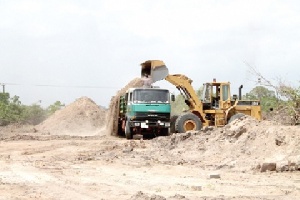The sand winning menace is posing similar level of danger to Ghana’s environment and water resources as compared to illegal small scale mining popularly known as “galamsey”.
The practice involved the digging of soil upstream which results in particles of sand moving into the water downstream making it very dirty and causing high turbidity.
Mr Nicholas H. Okyere, Northern Regional Water Quality Assurance Manager of the Ghana Water Company Limited in Tamale, made this known in an interview with the Ghana News Agency on the sideline of the University for Development Studies/Community Water and Sanitation Agency (UDS/CWSA) First Water and Sanitation Hygiene (WASH) Conference held at the UDS campus in Navrongo in the Upper East Region.
Mr Okyere explained that when this happened it required the addition of more chemicals (alum) to the water before all dirty particles in it could settle.
He said too much use of alum often resulted in the water turning acidic, which required another chemical to remove the acidity in order to make the water more alkaline.
“Too much use of chemicals affects water tariffs,” he disclosed.
Mr Okyere observed that as the water flowed, particles of the soil settled in the sump and contributed to destroying the pump faster when put to use.
He said the GWCL was raising the concern because the pumps that were replaced in 2008, had lost their efficiency due to continuous breakdowns.
He hinted that GWCL invested about GHC million Ghana to replace the pumps.
He warned that if the uncontrolled sand winning upstream the raw water abstraction point continued, the pumps were likely to give up their functionality.
Mr Okyere called for appropriate disposal of waste especially plastic, saying the inappropriate disposal of such products had damning repercussions on the operations of the company.
He cited the Nawuni community in the Northern Region located upstream the raw water abstraction point, where the people had develop too close to the river resulting in their waste being washed into the resource.
“The effect is that the polythene bags come to block the strainers of the pump and when that happens, the pumps are denied access to water which affects the pump itself and the company’s production levels,” he noted.
He said taking lessons from the Weija Head Works, the presence of Military at the Nawuni Community site would help bring the sand winning menace under control.
He called on the government and the media to extend the fight against the galamsey menace to cover sand winning.
The three-day conference organised was on the theme: “WASH: The Successes, Challenges and the Way Forward with Academia.”
It brought together players from the academia, civil society, governmental agencies, the private sector and the media among others to share ideas on how to improve the WASH sector in the country.
It was sponsored by WaterAid Ghana, SNV Netherlands Development Organisation, Catholic Relieve Services and World Vision International.
General News of Sunday, 6 August 2017
Source: ghananewsagency.org













